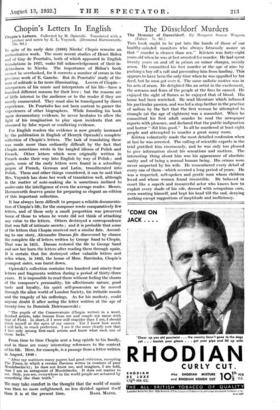Chopin's Letters In English
IN spite of its early date (1888) Niecks' Chopin remains an authoritative work. The more recent studies of Henri Bidou
and of Guy de Pourtales, both of which appeared in English translations in 1927, make full acknowledgement of their in- debtedness to Niecks. The importance of Bidou's book cannot be overlooked, for it corrects a number of errors in the
previous work of E. Ganche. But de Pourtales' study of the man of solitude is far more illuminating. Lovers of Chopin—
interpreters of his music and interpreters of his life—have a hundred different reasons for their love ; but the reasons are of little interest to the audience or to the reader if they are
merely enumerated. They must also be transfigured by direct experience. De Pourtales- has not been content to garner the experiences of other biographers. While founding his book upon documentary evidence, he never hesitates to allow the
light of his imagination to play upon incidents that are obscured by false report or conflicting evidence.
For English readers the evidence is now greatly increased by the publication in English of Henryk Opienski's complete collection of Chopin's letters. The task of translating these was made more than ordinarily difficult by the fact that Chopin sometimes wrote in the tangled idioms of Polish and French. Other letters which were originally written in French make their way into English by way of Polish ; and again, some of the early letters were found in a schoolboy jargon of French, German and Latin, transliterated into Polish. These and other things considered, it can be said that Mrs. Voynich has done her work of translation well, although in the matter of note-making she is sometimes inclined to under-rate the intelligence of even the average reader. Messrs. Harmsworth deserve praise for preparing so elegant an edition of this important collection.
• It has always been difficult to prepare a reliable documenta- tion of Chopin's life, for the composer wrote comparatively few letters, and of these only a small proportion was preserved Some of those to whom he wrote did not think of attaching any value to the letters. Others destroyed a correspondence
that was full of intimate secrets ; and it is probable that some of the letters that Chopin received met a similar fate. Accord- ing to one story, Alexandre Dumas fits discovered by chance
the complete file of letters written by George Sand to Chopin.
That was in 1851. Dumas restored the file to George Sand and saw her burn the letters after reading them through again. It is certain that fire destroyed other valuable letters and
relics when, in 1868, the house of Mme. Barcinska, Chopin's youngest sister, was burnt down.
Opienski's collection contains two hundred and ninety-four letters and fragments written during a period of thirty-three years. It is impossible to read them without feeling the charm of the composer's personality, his affectionate nature, good taste and loyalty, his quiet self-possession as he moved through the alien world of London Society, his irritable moods and the tragedy of his sufferings. As for his modesty, could anyone doubt it after seeing the letter written at the age of twenty-two to Dominik Dziewanowski :
"The pupils of the Conservatoire (Chopin writes) in a word, finished artists, take lessons from me and couple my name with that of Field. In short, if I were still stupider than I am, I should think myself at the apex of my career. Yet I know how much I still lack, to reach perfection. I see it the more clearly now that I live only among first-rank artiste and know what each one of them lacks."
From time to time Chopin sent a long epistle to his family, and in these are many interesting references to the context of his life. Here, for example, is a passage from a letter written in August, 1848 :
" After my matinees many papers had good criticisms, excepting The Times, in which a certain Davison writes (a creature of poor Mendelssohn's) ; he does not know me, and imagines, I am told, that I am an antagonist of Mendelssohn. It does not matter to me. Only, you see, everywhere in the world people are actuated by something else than truth."
We may take comfort in the thought that the world of music was then no more enlightened, no less divided against itself than it is at the present time. BASIL MAINE.






























 Previous page
Previous page